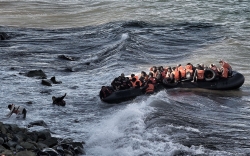








At least 435 people have drowned trying to reach Greece so far this year, International Organization for Migration says
As boats carrying thousands of refugees from war-torn countries including Syria continue arriving on Greek shores, an ecological crisis is also emerging as the detritus they leave behind piles up, environmental groups say.
In November more than 3,000 refugees arrived daily on the Greek island of Lesbos, a common landing point. About half of the 660,000 refugees who have reached Greece this year have landed on the 630-square mile island of about 86,000 people, according to the United Nations refugee agency UNHCR.
Refugees have left behind mounds of life jackets and rubber dinghies as they continue their journeys deeper into Europe. What hasn’t been piled up at a nearby dumpsite has been left along shorelines, threatening to pollute the island and surrounding waters.
In response, an informal coalition of volunteers has devised a plan to recycle some of these materials into products like backpacks to be sold to the public, or temporary shelters for refugees. Unemployed Greeks can be hired to help make the products, volunteers said.
“It’s all about up-cycling and transforming garbage in landfills into products,” Jai Mexis, a Greek volunteer, told Al Jazeera. “They will be used to create new products — from bags to raincoats to calendars — we can sell to get money to refugees and support unemployed Greeks.”
About 100 volunteers, mostly from Greece and other European countries, began the first phase of the project last week, collecting waste and cleaning up Lesbos’ shores, according to volunteer Elisabeth Dimitras.
Dimitras, who lives in Athens, began volunteering in Lesbos in October in response to the refugee crisis. After seeing the problem for herself and realizing that neither aid from Greece’s austerity-hit government nor humanitarian groups could keep up with the needs of refugees, Dimitras — like many other European volunteers — gave up her job to help refugees in Lesbos. Some volunteers sustain their actions through fundraising or by setting up nonprofit organizations, while others simply use their vacation days and leave family and friends behind to help strangers.
Mexis, who is helping design products to be made from the discarded materials, had previously worked in Jordan’s Zaatari refugee camp. He also has helped set up a kitchen where volunteers cook for refugees or Greeks in need in Athens.
When Mexis recently decided to help set up a second kitchen in Lesbos, he saw that refugees were housed in makeshift shelters that lacked roofs. He also noticed that nearby there were dozens of rubber boats with materials that could be used in the shelters. Once he and other volunteers used plastic and rubber to make roofs, they came up with other ideas to use the discarded material.
“It’s addressing an ecological problem and human problem,” Mexis said.
After refugees arrive in Lesbos, “they leave all the clothes, life vests, and other materials — entire beaches are transformed to orange and black,” Mexis said.
Now that volunteers have collected the materials, the next step is to sort them and finish the designs and dimensions of the products.
“Then we will know, for example, we need two life vests to complete one bag,” Mexis said.
Lesbos Mayor Spyros Galinos met with Mexis last week to discuss the plan. Galinos, Mexis says, is supportive of the project and is looking into ways he can help, whether it’s trucks to transport the materials or space to create a small factory.
“They want a good story out of Lesbos,” Mexis said. “If this is successful as a pilot project then it can be used in other places.”
The volunteers said they need to raise initial funding for machinery to manufacture the products, but once the products begin to be sold the project will be self-sustaining.
“What we’re trying to do is help unemployed Greeks and give them opportunities … this is the positive side of a crisis,” Mexis said. “This is something I really urge younger people to do. Youth must look for unconventional jobs, create jobs instead of finding one. Jobs in the system don’t exactly give us moral satisfaction in our generation — why not try different things?”
Up to 1,000 refugees a day are arriving on the island of Lesbos, with the majority from Syria and Afghanistan
Comments by mayor of Greek island come as UN says record number of refugees crossed Mediterranean in October
European activists collecting donations for refugees in French port say people can succeed where governments fail
Five other people were rescued Monday as flow of refugees from war-torn countries to Europe continues
Producer Aaron Ernst traced the paths of Syrian refugees through Europe, documenting their stories along the way
Error
Sorry, your comment was not saved due to a technical problem. Please try again later or using a different browser.